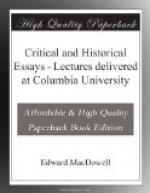We already know that when the auxiliary speech which we call music was first discovered, or, to use the language of all primitive nations, when it was first bestowed on man by the gods, it retained much of the supernatural potency that its origin would suggest. In India, music was invested with divine power, and certain hymns—especially the prayer or chant of Vashishtha—were, according to the Rig-Veda, all powerful in battle. Such a magic song, or chant, was called a brahma, and he who sang it a brahmin. Thus the very foundation of Brahminism, from which rose Buddhism in the sixth century B.C., can be traced back to the music of the sacred songs of the Rig-Veda of India. The priestly or Brahmin caste grew therefore from the singers of the Vedic hymns. The Brahmins were not merely the keepers of the sacred books, or Vedas, the philosophy, science, and laws of the ancient Hindus (for that is how the power of the caste developed), but they were also the creators and custodians of its secular literature and art. Two and a half thousand years later Prince Gautama or Buddha died, after a life of self-sacrifice and sanctity. On his death five hundred of his disciples met in a cave near Rajagriha to gather together his sayings, and chanted the lessons of their great master. These songs became the bible of Buddhism, just as the Vedas are the bible of Brahminism, for the Hindu word for a Buddhist council means literally “a singing together.”
Besides the sacred songs of the Brahmins and Buddhists, the Hindus had many others, some of which partook of the occult powers of the hymns, occult powers that were as strongly marked as those of Hebrew music. For while the latter are revealed in the playing of David before Saul, in the influence of music on prophecy, the falling of the walls of Jericho at the sound of the trumpets of Joshua, etc., in India the same supernatural power was ascribed to certain songs. For instance, there were songs that could be sung only by the gods, and one of them, so the legend runs, if sung by a mortal, would envelop the singer in flames. The last instance of the singing of this song was during the reign of Akbar, the great Mogul emperor (about 1575 A.D.). At his command the singer sang it standing up to his neck in the river Djaumna, which, however, did not save him, for, according to the account, the water around him boiled, and he was finally consumed by a flame of fire. Another of Akbar’s singers caused the palace to be wrapped in darkness by means of one of these magic songs, and another averted a famine by causing rain to fall when the country was threatened by drought. Animals were also tamed by means of certain songs, the only relic of which is found in the serpent charmers’ melodies, which, played on a kind of pipe, seem to possess the power of controlling cobras and the other snakes exhibited by the Indian fakirs.




